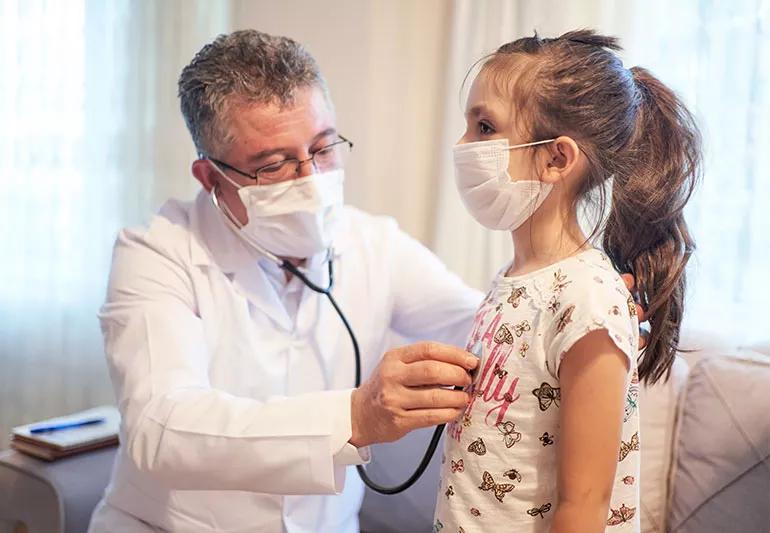Heart murmurs are quite common in kids and often fade away over time

Image content: This image is available to view online.
View image online (https://assets.clevelandclinic.org/transform/351f17fa-a238-4799-9382-622b97678595/CC_HE_1257837131_ChildrenHeartMurmurs_jpg)
Doctor listening to a child's heart with a stethoscope
A heart beats in a rhythmic loop — lub-dub, lub-dub, lub-dub — that serves as a soundtrack of life. This internal groove comes from vibrations as cardiac valves open and close and blood flows through your heart’s chambers.
Advertisement
Cleveland Clinic is a non-profit academic medical center. Advertising on our site helps support our mission. We do not endorse non-Cleveland Clinic products or services. Policy
But sometimes, an extra sound enters the mix. This whoosh or a swish or hum is known as a heart murmur. It’s quite common, especially in kids.
But that doesn’t make a child’s heart murmur diagnosis any less scary for parents. In fact, researchers found that anxiety levels climb in parents after a heart murmur is detected in their kid.
The good news? Worries decreased once parents got the facts about heart murmurs. To get you answers, let’s turn to pediatric cardiologists Rashmi Rao, MD, and Holly Nadorlik, DO.
Approximately 60% of children develop a heart murmur at some point while growing up, most commonly during the elementary school years, notes Dr. Rao. They’re typically discovered during a child’s routine well-check visit with their pediatrician.
The vast majority of heart murmurs are considered innocent, or benign. “That means there’s no abnormality in the heart,” she says.
Heart murmurs in kids commonly occur in the first few days after birth and during growth spurts. Most children eventually just outgrow a heart murmur, though some may last a lifetime with no adverse effects.
Innocent murmurs typically sound soft and can even vary with the position of the child, says Dr. Nadorlik. These types of murmurs can sound louder if a child is sick or dealing with some sort of stress.
Advertisement
So, what causes the extra sound? “It’s a sound created by blood flowing normally through the heart or heart vessels,” explains Dr. Rao. “But there’s really no true steadfast reason as to why these innocent murmurs happen.”
Video content: This video is available to watch online.
View video online (https://cdnapisec.kaltura.com/p/2207941/sp/220794100/playManifest/entryId/1_po2w6965/flavorId/1_5f3sgelj/format/url/protocol/https/a.mp4)
In some cases, yes. Heart murmurs in children could be a sign of a condition such as:
The sound of a murmur as heard through a stethoscope may be a sign of whether it’s “innocent” or not. More concerning murmurs often have a harsher quality or clicking sound, notes Dr. Nadorlik.
Pitch, timing and volume of a murmur can offer hints of an underlying heart valve or muscle issue. (How loud can murmurs get? “You can hear really loud murmurs without a stethoscope and even feel them with your hand,” says Dr. Nadorlik.)
A concerning murmur may bring a recommendation for monitoring and testing. “An echocardiogram, or ultrasound of the heart, can help us learn more about what’s going on,” says Dr. Rao.
A heart murmur on its own typically isn’t a reason to sideline a child from sports. “The vast majority of children with murmurs, particularly innocent ones, can participate in any sport or activity they choose,” states Dr. Rao.
There may be restrictions suggested for certain activities if the murmur is connected to a heart or health issue.
If your child gets diagnosed with a heart murmur, take a deep breath and get more information. “A heart murmur is pretty common — and it’s not usually a sign that there’s something bad or scary going on with your child’s heart,” reassures Dr. Rao.
Advertisement

Sign up for our Health Essentials emails for expert guidance on nutrition, fitness, sleep, skin care and more.
Learn more about our editorial process.
Advertisement
Information you need, on and off the field
Most teething symptoms are mild — fevers and other major symptoms are likely something else
Gentle care, like moisturizing, washing and soft brushing, can help clear up cradle cap
Babies are born with very little of this vitamin, which plays a critical role in the blood clotting process
The emergency room is for serious medical issues; urgent care can help when you can’t get a quick appointment with your child’s doctor
Gripe water isn’t regulated by the FDA, and research doesn’t support its use
Lice don’t jump — but they can spread with direct head contact
Some warts will clear up on their own, but others may need home remedies or medical care
Although it could be used as a moisturizer, this new trend is not recommended
Communicating clear limits helps protect your time, energy and emotional well-being
High cholesterol can be genetic, but testing and treatment can lower your heart disease risk